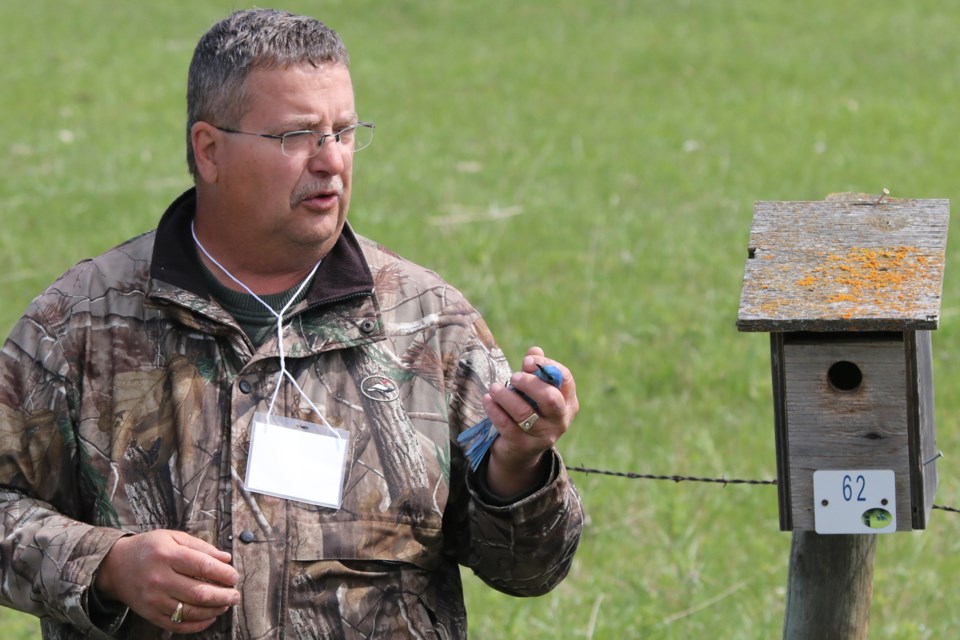OLDS — The COVID-19 pandemic has forced local resident Ron Reist to remain in central Alberta instead of jetting off to exotic locations around the world to pursue his favourite hobby – birdwatching.
Reist had planned to travel to Brazil this September on a birdwatching expedition but he dropped those plans now that the pandemic is exploding in that country.
“I think it’s going to take two or three years to settle down in that country, just because they’re a little corrupt and you don’t know who to believe anymore,” Reist said.
Instead of going to Brazil, the plan now is to go to the African country of Malawi in September 2021.
“They’ve got exceptional birds and everything there would be brand new to me of course. I don’t think I would recognize anything. So that would be tremendously exciting,” he said.
In March, he was scheduled to look for birds in Thailand, but that trip too got scrubbed, due to COVID. Reist is hopeful it can be rescheduled for next March.
Reist, a retired pharmacist, does not go on these expeditions as any kind of scientist. It’s just a hobby which he has been pursuing for the past 15 years or so. He has no formal scientific training and goes as simply a private, but very enthusiastic citizen.
“It’s just purely pleasure and sort of like a treasure hunt in the jungle,” he said. “I’ve been to quite a few places and there’s still quite a lot more out there.”
Sometimes Reist’s wife, well-known local photographer Veronica Reist, accompanies him. But that depends on where the trip is.
“She goes to the places that (have) moderate temperatures,” Reist said. “And I mean, she’s not as passionate as I am. She’s a wonderful photographer, but before dawn till dark 10 days in a row can be pretty exhausting.”
Reist has been fascinated with birds ever since he can remember. He grew up in a small town near Camrose. His dad was a doctor.
“I grew up (near) a country slough and stole duck eggs and showed them to my parents and just always liked nature,” Reist said.
“Father was a great outdoorsman and so we followed him around and just carried on.”
There are at least 10,000 species of birds in the world – and perhaps as many as 18,000 according to new research.
Reist’s goal is to see at least 2,500 in his lifetime. Right now, he’s at 1,995, just five short of his intermediate goal to see 2,000 by the end of this year.
“Who knows how much longer I’ll be able to go through airports and travel the world, so I want to see 2,500 quickly,” he said.
Reist does have an opportunity to hit that initial 2,000 mark even though he’s now marooned in Canada this year as a result of the pandemic. He can look for birds in southern Alberta.
“There’s a few species down in southern Alberta that I need to find and there’s a couple of owls around here that I just can’t seem to track down, but eventually they’ll show themselves,” he said.
An outside possibility is to travel to the east coast to see some birds.
“Seabirds are always there and they’re hard to find and you have to go through extra hoops to find them,” he said.
“But if you want more bang for your buck, you want to go to the tropics, I think. Just to travel to Newfoundland to find 10 different species – much as I want to go to Newfoundland – it doesn’t make a lot of sense.”
Some birders post online places where they’ve seen certain birds.
Reist did that once, but will likely never do so again.
Many years ago, he spotted a bird that at the time was very rare in Alberta.
“It was in this farmer’s yard basically in a little slough next to his house and he got over a hundred vehicles there the next day looking for this bird. And he was so mad at me that we still don’t speak to this day,” he said.
Earlier this year, a couple of owls were spotted on a golf course in Sylvan Lake.
That sighting spurred hundreds of birders to visit the area, he said. But he wasn’t one of them.
“I mean, it would have been an hour drive to see a bird that I’ve never seen, but not interested when there’s going to be 50 people looking at it at the same time,” he said. “I think it is hard on them. I think it disrupts their feeding abilities day after day.
“If it was just for a couple of hours one day that might not be so bad. But when word gets out and they’re easy to see, then everybody all from over central Alberta goes (out to see them).”
Reist was frustrated not to be able to travel around the world to go on bird watching expeditions this year, but he’s come to terms with that.
“I mean, this is a hobby. It’s not my livelihood, like some people,” he said.



